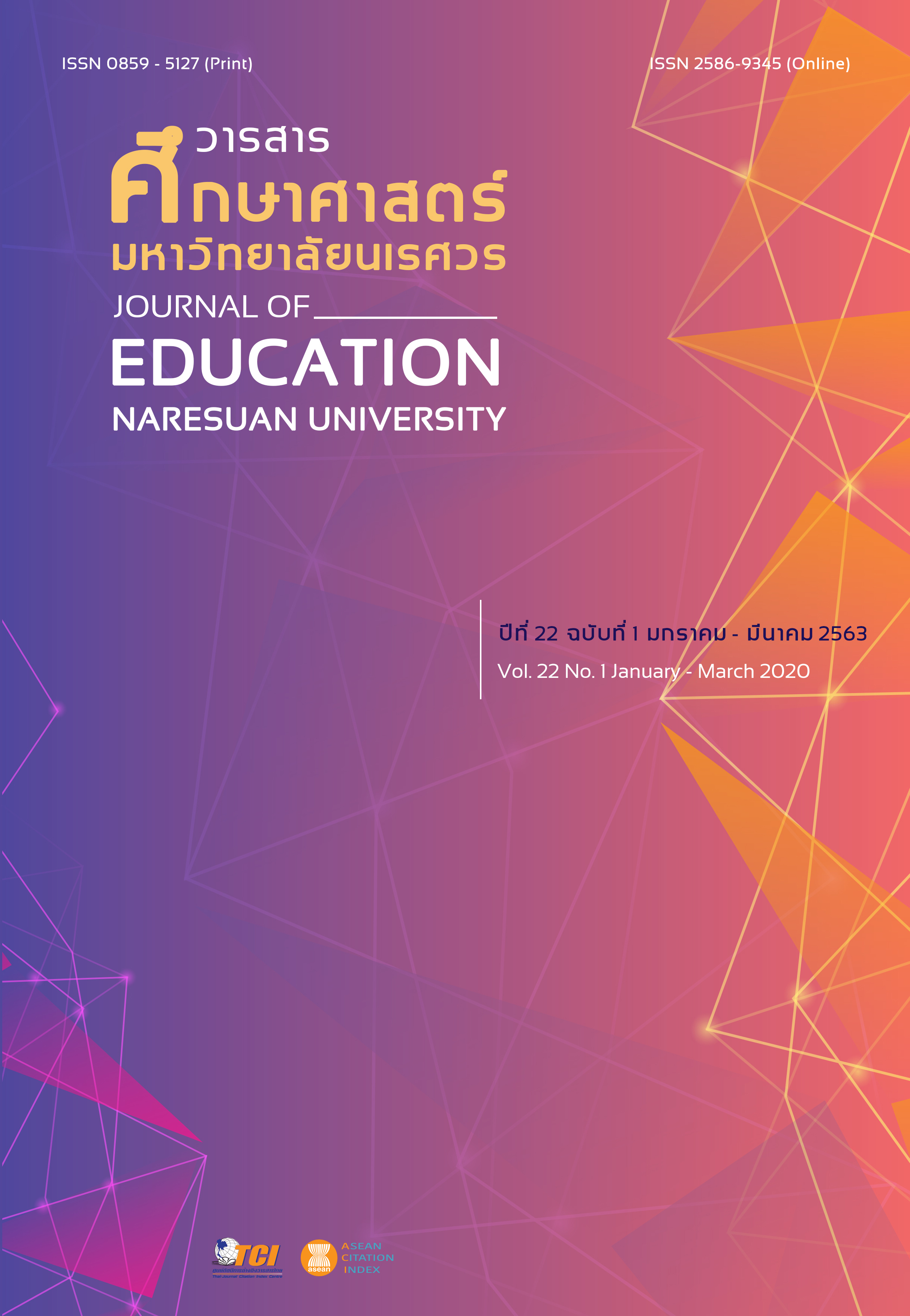DEVELOPING LEARNING MANAGEMENT OF SOCIAL CONSTRUCTIVIST INTEGRATE – TECHNOLOGY TO PROMOTE COMMUNICATION SKILLS FOR COLLABORATION IN TOPIC OF POPULATION FOR GRADE 12th STUDENTS
Main Article Content
Abstract
This research purpose was studying learning management about topic of population through social constructivist learning theory with technology – integrated to promoting grade 12th communication skills for collaboration. Four cycles of action research including: 1) plan, 2) action, 3) observe, and 4) reflect. Thirty – two students participated in this research. Research tools were lesson plans, reflective journals, semi – structured observation, student learning tasks, and unstructured interview. Content analysis, Resource Triangulation, and Peer Debriefing were used for data analysis. The result showed that the development of each stage of learning by using social constructivist theories with integration of technology as follows: 1) finding new knowledge teacher should support students to search through various and reliable resources, 2) expending agreement students are modified and further their knowledge during group work and within classroom, 3) collaborating knowledge the teacher had to integrate more technology to rise the communication channels and give opportunity for students to expand their understandings of population, and 4) reflecting work. Have students use Facebook to evaluate and provide feedback on how they work within groups and between groups. In addition, this research found that students can improved communication skills for collaboration with parts of non – verbals, listening – talking, and reading – writing.
Article Details
The owner of the article does not copy or violate any of its copyright. If any copyright infringement occurs or prosecution, in any case, the Editorial Board is not involved in all the rights to the owner of the article to be performed.
References
Barak, M. (2016). Science teacher education in the twenty-first century: A pedagogical framework for technology-integrated social constructivism. Research in Science Education, 47(2), 283-303.
Chaijaroen, S. (2002). Constructivist theory. Konkan: Konkan University. [in Thai]
Faikhamta, C. (2016). Action research in science classroom. Bangkok: Institute of Academic Development. [in Thai]
Jantarakantee, E. (2015). Pre-service science teachers’ use of information and communication technology (ICT) to teach science. Silpakorn University Journal, 35(2), 131-145. [in Thai]
Kowatrakul, S. (2007). Educational psychology (7th ed.). Bangkok: Chulalongkorn University. [in Thai]
Kultawanich, K. (2011). Facebook: The practice of social constructivist in blended learning. In National e-learning conference 2011 (pp. 367-373). Bangkok: Thailand Cyber University Project. [in Thai]
Maneekat, P. (2015). Developing communication and collaboration skills by SE Model presentation of grade 10 Prince Royal's College students. Retrieved April 30, 2016, from https://www.prc.ac.th/Academic/TeacherResearch/ResearchDetail.php?ID=1724 [in Thai]
National Education Association. (2012). Preparing 21st century students for a global society. Retrieved May 1, 2016, from https://www.nea.org/assets/docs/A-Guide-to-Four-Cs.pdf
Nuangchalerm, P. (2015). 21st Century learning in science. Journal of Rangsit University: Teaching & learning, 9(1), 136-154. [in Thai]
Partnership for 21st Century Skills. (2015). 21st century future learning skill. Retrieved April 28, 2016, from https://www.p21.org/storage/documents/docs/P21_Framework_Definitions_New_Logo_2015.pdf [in Thai]
Ritcharoon, P. (2016). Assessment for Learning Development. STOU Education Journal, 9(1). 1-17. [in Thai]
Sangjunruang, K. (2011). Social learning promotion and development by online social network. (Case Study: Facebook.com by Thammasat University students) Bangkok: Thammasat University. [in Thai]
Somabut, A. (2013). Constructivist theory. Retrieved October 15, 2016, from https://teacherweekly.wordpress.com/2013/09/25/constructivist-theory/ [in Thai]
Suksamran, P., Chaiprasert, P., & Srisangyong, S. (2016). A study of biology learning achievement and metacognition using constructionism theory on biodiversity for grade 12 students. Journal of education Naresuan University, 18(3), 189-201. [in Thai]
Tweed, A. (2009). Designing effective science instruction: What works in science classrooms. Arlington, VA: National Science Teachers Association.


